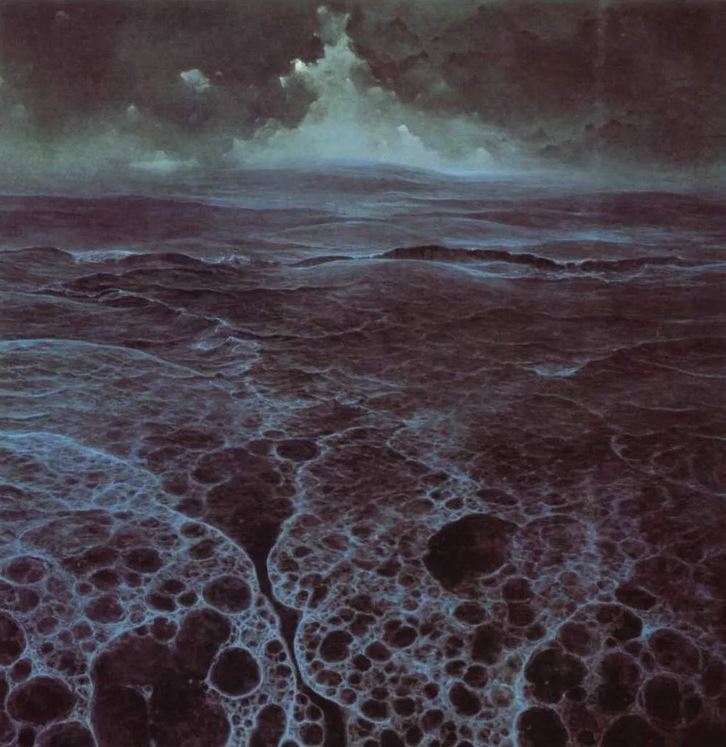by Tom Holmes (February 2024)

When Death Is the Object and Subject of Trauma
The Black Death began around 1346 and ended in 1350/1351. Then there were eight plague aftershocks between 1361 and 1393.
I. Violence
She could not scrub the black
from her daughter’s finger tips
and her bubo swelled. She paced
from bed to door to bed chanting
My girl will die, will die, will die.
–
The doctor popped the bubo,
released fluids and stench
of sharp flatulence like all the town.
She couldn’t smell her daughter’s death.
The father carved a wooden doll.
–
Then stabbed its heart and head.
–
II. Survival
This fault is with the filthy,
immigrant poor. Let’s build a wall.
And pray and pray. It’s logical.
–
The poor, both clean and scummed, died
and the wealthy, and the priests,
and the doctors. And the supplicants.
–
Family phantoms gurgled
bad breath from under the bed
where the father caressed the doll.
–
He forsook prayer and wished
the phantoms to particulate,
to fog, to blow away.
–
Outside his home, a breeze
and rats infested with fleas.
–
III. Silence
The arrival of a subtle crack
crept from pole to pole across the moon.
Astrologers and scientists calculated
the end. Commoners counted days
until their infection and divided
the result by the number of months
until the earth boiled or froze.
A few prayed inside their hands.
I counted rats. Then the infected.
Then the number of graves to dig.
The dead and dying outnumbered
the living, and math like dying
is reticent and limitless. I caressed
my cold daughter’s doll. I wondered
about the other side of the equation
and the phantom X. It proved
unsolvable. I caressed my daughter
and coughed and ended the quiet.
–
IV. Witness
I rolled so many stones
with purpose from here
to the cemetery. I shoveled
one grave for the mass
of them and layered them
eye to eye, then with stones.
No one saw me
not even the dead.
They were all dead.
=
V. Memory
I roll so many stones
from cemetery to town I undig
the grave I attempt to rebuild
the human race from rocks and bones
that persist beyond God’s black vengeance
and thereafter I caress the doll and rest
her on the remnants’ northern pole
because the moon is still here
because the deeds of death endure
The Gray Death: Eleven Years after the Passing of the Black Death
The Black Death washes
away on a small British isle.
Half of Europe, Asia, Africa sing
their heroic tales of survival.
Half withdraw from family
to a personal space and negotiate
between speaking the unutterable
and the unutterable silenced.
Then arises the powerfulest
desire across Europe, Asia, Africa—
the urge to laze, to unburden
the long, heavy obscurity
they drag behind them all hours,
so close to dying. In traumatic
aftershock, just on the edge
of forgetting, the first resurgence
of the plague, as God ordains.
Children born at the tail end
of his Black Death know nothing
to suppress or say. In invincible
courage, they sharpen sticks
and play, The Poking of the Rats.
Fathers do not want to know.
Mothers command, Wash your hands.
Like all children, they will not
listen. They slash and tie rat
tails into nooses or necklaces.
They walk home swiping hands
on their scarves and sleeves. See.
They’re clean. They say
grace and eat their hot,
gray, post-pandemic meal
in wake of the first resurgence—
God’s unmentionable edict
to slaughter, once again,
unmemorable people so fair.
A Merchant Ship from Genoa, Italy, on March 24th, 1345
The fourth day at sea a bump
surfaces on the captain’s neck.
A whitecap bounces the ship.
Then another and another.
The chef feels a bubo
in his armpit. It itches, hot.
Both men smell like feted blood.
On the eighth day, three more men.
Panicked sailors hide
beneath deck in horse stalls
near the barrel of lemons
with rats and fleas.
The ship loses course.
“It’s destiny for our sins,”
a sailor preaches as he ropes
the captain to the helm. “Steer.”
His face is ruddy and can’t see.
They strap a gold compass
to his head and layer it
with grounds of old tea.
The world spins the boat.
Someone coughs blood.
Another sneezes bile.
“We’re infected. Save our souls.”
There’s a splash of water
The captain’s compass floats away,
and a seagull nips his left eye.
There’s another splash and another.
A survivor whispers to the wind,
another heckles the sun.
Soon they eat the horses,
then the rats eat the men.
Table of Contents
For over twenty years, Tom Holmes is the founding editor and curator of Redactions: Poetry & Poetics. Holmes is also the author of five full-length collections of poetry, including The Book of Incurable Dreams (Xavier Review Press) and The Cave, which won The Bitter Oleander Press Library of Poetry Book Award for 2013, as well as four chapbooks. He teaches at Nashville State Community College (Clarksville). His writings about wine, poetry book reviews, and poetry can be found at his blog, The Line Break: thelinebreak.wordpress.com/. Follow him on Twitter: @TheLineBreak
Follow NER on Twitter @NERIconoclast
- Like
- Digg
- Del
- Tumblr
- VKontakte
- Buffer
- Love This
- Odnoklassniki
- Meneame
- Blogger
- Amazon
- Yahoo Mail
- Gmail
- AOL
- Newsvine
- HackerNews
- Evernote
- MySpace
- Mail.ru
- Viadeo
- Line
- Comments
- Yummly
- SMS
- Viber
- Telegram
- Subscribe
- Skype
- Facebook Messenger
- Kakao
- LiveJournal
- Yammer
- Edgar
- Fintel
- Mix
- Instapaper
- Copy Link









